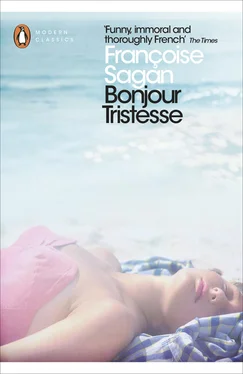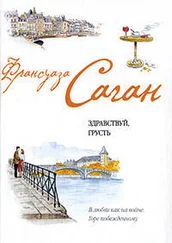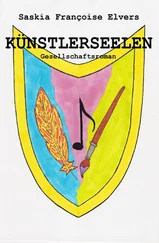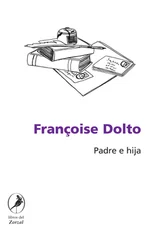‘She has got to study during these holidays,’ said Anne, closing her eyes to shut off further conversation.
I cast a despairing look in my father’s direction. He responded by giving me an embarrassed little smile. I had a sudden vision of myself faced with pages of Bergson, 4with those lines of black print jumping out at me and the sound of Cyril’s laughter drifting up. The very thought horrified me. I dragged myself over to Anne and called out to her softly. She opened her eyes. I leant over her with an anxious, pleading face, sucking in my cheeks even more to give myself the look of an overworked intellectual.
‘Anne,’ I said, ‘you can’t do this to me. You can’t make me work in this heat and in the holidays – they could do me so much good.’
She looked at me intently for a moment, then smiled enigmatically and turned her head away.
‘It’s my duty to do “this” to you, even in this heat, as you say. I know you – you’ll only hold it against me for a couple of days and you’ll pass your exam.’
‘There are some things there’s no getting used to,’ I said, no hint of laughter in my voice.
She responded with a look of amused arrogance and I lay back down on the sand, feeling very worried. Elsa was holding forth about the various festivities taking place along the Riviera, but my father was not listening to her. From his position at the apex of the triangle formed by their bodies, he kept looking at Anne’s upturned profile and her shoulders with that rather fixed, unruffled gaze of his, one that I recognized. His hand was opening and closing on the sand in a gentle, regular, tireless movement. I ran down to the sea and plunged in, lamenting the holidays that we might have had and were now not going to have. We had all the makings of a drama: there was a seducer, a vamp and a woman who knew her own mind. I caught sight of a beautiful shell-like object on the sea bed, a pink and blue stone. I dived down to get it. It was worn all smooth and I kept it in my hand until lunch. I decided it was a lucky charm and that I would hang on to it all summer. I don’t know why I haven’t lost it, because I lose everything. I am holding it today; it is pink and warm and it makes me want to weep.
Four
What surprised me most during the days that followed was how extremely nice Anne was to Elsa. Elsa’s conversation was sprinkled with numerous idiotic remarks but Anne never responded to them by uttering any of those curt phrases that she had such a knack for, and that would have made poor Elsa look ridiculous. I inwardly commended her for her patience and generosity, without realizing how much shrewdness was involved. My father would quickly have tired of any such savage little game. Instead, he was grateful to her and could not do enough to express his appreciation. In any case, this gratitude of his was only a cover. There was no doubt that, when he spoke to her, it was as to a highly respected woman, a second mother to his daughter. He even played that card by seeming constantly to put Anne in charge of me, making her to a certain extent responsible for the kind of person I was, as if to bring her closer and bind her to us more tightly. But he would look at her and motion to her as to a woman he did not know but whom he desired to know – to know, that is, in an intimate way. It was the same kind of considerateness as that I sometimes detected in Cyril, which made me want simultaneously to run from him and to lead him on. I must have been more impressionable than Anne. She responded to my father with an indifference and a serene good grace that put my mind at rest. I reached the stage of thinking that I had been mistaken that first day. I failed to see that this sheer good grace of hers was hugely appealing to my father. And above all there were her silences … silences that seemed so natural and so elegant. They formed a sort of antithesis to Elsa’s constant chirruping, like the contrast between sun and shade. Poor Elsa, she really did not suspect anything. She went on being loud and over-excited and still just as wilted-looking from the sun.
One day, however, she must have realized. She must have intercepted a glance from my father. I saw her murmur something in his ear before lunch. For a moment he looked surprised and put out, but then he nodded with a smile. At coffee, Elsa stood up, walked over to the door, turned towards us in a languorous way – greatly inspired, it seemed to me, by American movies – and, injecting into her intonation ten years’ worth of French amorousness, said:
‘Are you coming, Raymond?’
My father stood up, blushing almost, and followed her out, extolling the virtues of the siesta. Anne had not moved. Smoke curled up from the cigarette she held between her fingers. I felt obliged to say something.
‘People maintain that a siesta is very restful but I don’t think that’s true …’
I stopped myself immediately, conscious of the ambiguity of what I was saying.
‘Please,’ said Anne coldly.
She had not even taken my comment to be ambiguous. She had straight away seen it as being a joke in poor taste. I looked at her. She was wearing a deliberately calm, relaxed expression, which I found disturbing. Perhaps at that moment she was madly jealous of Elsa. A cynical idea for cheering her up occurred to me and I was pleased by it, as I was by all my cynical ideas. Bolstered by a sort of confidence and a sense of colluding with myself that was quite intoxicating, I could not resist putting my thoughts into words:
‘Mind you, with Elsa being so sunburnt, that kind of siesta can’t be much fun for either of them.’
I would have done better not to have spoken.
‘I detest that kind of remark,’ said Anne. ‘At your age it’s worse than stupid, it’s tiresome.’
I promptly lost my nerve.
‘I only said it as a joke. I’m sorry. I’m sure that they’re very happy really.’
She turned to face me with a weary look. I immediately apologized. She closed her eyes and began to speak in a low, patient voice:
‘Your idea of love is a rather simplistic one. Love isn’t a series of isolated sensations …’
It struck me that that was just what all my experiences of love had been: a sudden surge of emotion at someone’s gaze or gesture or kiss … Radiant moments without any underlying connection, that was all the memory I had of them.
‘It’s something different,’ Anne was saying. ‘It’s about constant tenderness, gentleness, missing a person … Things you wouldn’t understand.’
She made an evasive gesture and picked up a magazine. I would have preferred it if she had shown anger at my emotional deficiency, or had abandoned that air of resigned indifference. It struck me that she was right, that I lived on an animal level, letting myself be led by the wishes of others, and that I was a poor, weak creature. I despised myself, and it was terribly painful to me because I wasn’t used to that, to passing judgement on my actions, so to speak, as to whether they were good or bad. I went up to my room and mused a bit. The sheets were warm beneath me. I could still hear Anne’s words: ‘What’s different about it is missing a person.’ Had I ever missed anyone?
I can no longer recall the various events of that fortnight. As I’ve said already, I didn’t want to face up to there being any precise threat to our happiness. I do of course recall very clearly the rest of the holiday because I brought to bear on it all my attention and all that I was capable of. But as for those first three weeks, which were, in fact, three happy weeks … Which day was it that my father looked very conspicuously at Anne’s mouth? Was it the day he reproached her out loud for her aloofness, while pretending to laugh at it? Or when in all seriousness he compared her subtlety to the half-wittedness of Elsa? My peace of mind rested on the stupid notion that, if they had been bound to love each other, having known each other for fifteen years, they would have started sooner. ‘What’s more,’ I said to myself, ‘if it has to happen, my father will be in love for three months and Anne will carry away from it a few passionate memories and a mild sense of humiliation.’ Yet surely I knew that Anne was not a woman whom you could abandon just like that? But Cyril was there and he was all I needed to think about. In the evenings we would often go out together to nightclubs in Saint-Tropez, where we would dance to the swooning rhythms of a clarinet, murmuring words of love that I had forgotten by the following morning but that at the time had sounded so sweet. During the day we went sailing round the coast. My father sometimes came with us. He thought a lot of Cyril, especially since the latter had let him win in a race they had had, doing crawl. He called him ‘Cyril, my boy’ and Cyril called him ‘sir’, but I sometimes wondered which of the two was the true adult.
Читать дальше












